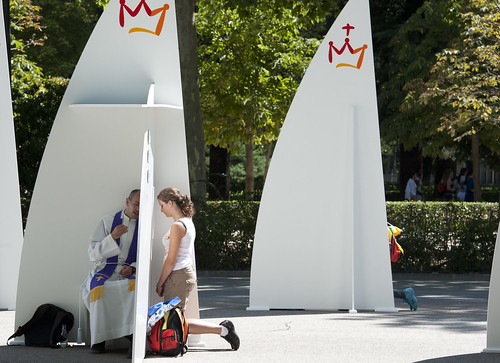The saddest thing about ignorance is that it often leads to hate.
That’s why it irks me big time when people say that Confession was “invented” in the Middle Ages, so that people would share their dirty little secrets and “useful” information to their equally corrupt clergy.

I’ve always admired the early Christians. They were close enough to Jesus’ time yet far enough from seeing the billion-strong membership that is the fruit of their faithfulness to God. And they’re the original Catholic hipsters. 😛 Photo by Live Action Hero on Flickr under CC BY 2.0
Truth is, Confession has been here — at least in its rudiments — since biblical times! And even before Jesus instituted it formally, St John the Baptist already heard people’s confessions before he baptized them in the Jordan River. (Of course, his version of confession rite was merely symbolic of the people’s repentance, with no effects equal to those of the Sacrament which Jesus would institute years later.)
Immediately after Jesus ascended to heaven, the first Christians were already encouraging each other to go to Confession. They looked at the Sacrament as necessary for salvation. Their faith was sincere and simple, as can be gleaned in these quotes from some early Christians:
“If the serpent, the devil, bites someone secretly, he infects that person with the venom of sin. And if the one who has been bitten keeps silence and does not do penance, and does not want to confess his wound . . . then his brother and his master, who have the word [of absolution] that will cure him, cannot very well assist him.”
– St Jerome, Commentary on Ecclesiastes 10:11 [AD 388]“It is necessary to confess our sins to those to whom the dispensation of God’s mysteries is entrusted. Those doing penance of old are found to have done it before the saints. It is written in the Gospel that they confessed their sins to John the Baptist [Matt. 3:6], but in Acts [19:18] they confessed to the apostles.”
– St Basil the Great, Rules Briefly Treated 288 [AD 374]“Of how much greater faith and salutary fear are they who . . . confess their sins to the priests of God in a straightforward manner and in sorrow, making an open declaration of conscience. . . . I beseech you, brethren, let everyone who has sinned confess his sin while he is still in this world, while his confession is still admissible, while the satisfaction and remission made through the priests are still pleasing before the Lord.”
– St Cyprian of Carthage, The Lapsed 28 [AD 251]“[A final method of forgiveness], albeit hard and laborious [is] the remission of sins through penance, when the sinner… does not shrink from declaring his sin to a priest of the Lord and from seeking medicine, after the manner of him who say, ‘I said, “To the Lord I will accuse myself of my iniquity.””
– Origen, Homilies on Leviticus 2:4 [AD 248]“[Regarding confession, some] flee from this work as being an exposure of themselves, or they put it off from day to day. I presume they are more mindful of modesty than of salvation, like those who contract a disease in the more shameful parts of the body and shun making themselves known to the physicians; and thus they perish along with their own bashfulness.”
– Tertullian, Repentance 10:1 [AD 203]“Confess your sins in church, and do not go up to your prayer with an evil conscience. This is the way of life. . . . On the Lord’s Day gather together, break bread, and give thanks, after confessing your transgressions so that your sacrifice may be pure.”
– The Didache 4:14, 14:1 [A.D. 70]
These quotes were culled from Catholic.com










